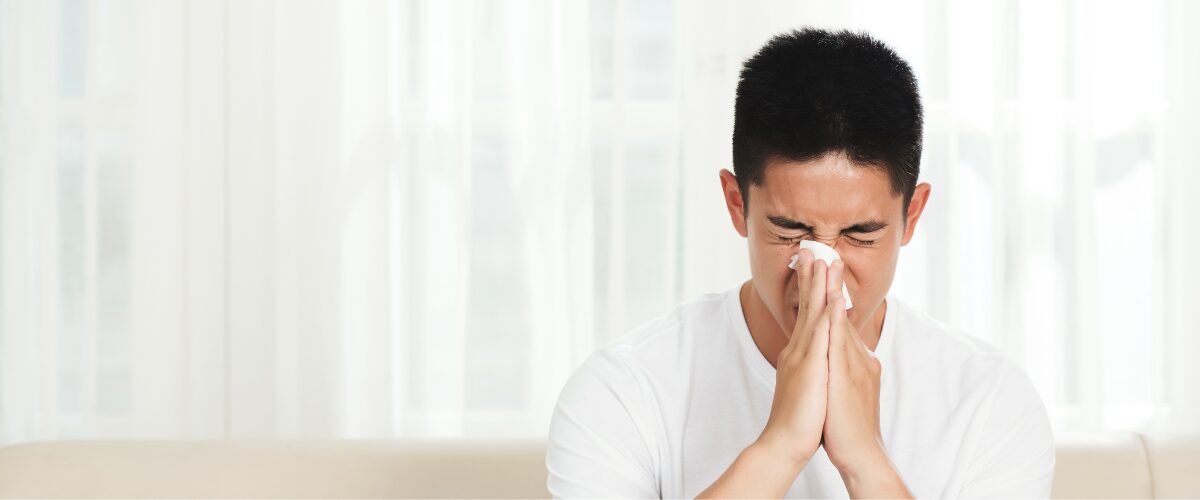
24 Apr Sinus Care: How to Treat and Prevent Sinusitis
Sinus Care: How to Treat and Prevent Sinusitis
By Island Hospital | Apr 24, 2024 11:00:00 AM
While sinusitis is a common condition that usually goes away on its own, the symptoms may persist or worsen – affecting our day-to-day routine.
Therefore, tips to relieve symptoms and prevent sinus infections are valuable. The solutions for this condition range from simple at-home treatments to clinical treatments and prescribed medications.
Learn comprehensive sinus care in our guide, where we cover types, symptoms, causes, diagnosis, treatment, and prevention strategies for sinusitis.
What are Sinuses?
Sinuses are small, air-filled spaces in the skull. They are found in the forehead, cheek, nose, and eye areas; and are connected by narrow passages.
Sinuses are lined by membranes which produce a thin secretion to capture particles and maintain moisture in the nasal passages.
Here are the four pairs of sinuses:
- Frontal sinuses: Located in the forehead.
- Maxillary sinuses: Located in the cheeks.
- Ethmoid sinuses: Located behind the bridge of the nose.
- Sphenoid sinuses: Located deep in the skull, behind and between the eyes.
What is Sinusitis?
Sinusitis is an inflammation of the membranes lining your sinuses. It is the result of an infection from a virus, bacteria, or fungus.
This inflammation results in a sinus blockage where mucus cannot drain into your nose.
This condition commonly happens after a cold or flu. Among other symptoms, it may cause facial pain and a blocked or runny nose.
While most people recover after 2 to 3 weeks, the duration highly depends on the underlying cause and the individual’s health status.
Types of Sinusitis
There are a few types of sinusitis, mostly characterized by the persistence and criticality of symptoms:
Type | Details |
|---|---|
| Acute Sinusitis | |
| Subacute Sinusitis | |
| Chronic Sinusitis | |
Symptoms of Sinusitis
The symptoms of acute sinusitis in adults often appear after a persistent or worsening cold after 7 to 10 days.
Here are a few common symptoms:
- Runny nose with thick, discolored mucus
- Blocked nose
- Fever
- Loss of smell and taste
- Postnasal drip
- Sore throat
- CoughBad breath
- Facial pressure (e.g., around eyes, nose, forehead)
- Aching in your teeth
- Tiredness
- Headache
Similar symptoms are found in chronic sinusitis and acute sinusitis. However, acute sinusitis lasts for a shorter period of time.
Do note that a green or yellow discharge does not always indicate a sinus infection or needing antibiotics. It is common for individuals with this symptom to recover without antibiotic treatment.
Consult your doctor for a proper diagnosis and the right treatment.
Causes of Sinusitis
Sinus infections develop when the sinus openings are blocked or fluid builds up, allowing bacteria and other germs to grow.
Most sinus infections are caused by viruses, and some infections are caused by bacteria.
Sinusitis can stem from one of these conditions:
- Issues with cilia: Small hairs (cilia) in the sinuses are unable to properly move mucus out. This could be attributed to certain medical conditions.
- Colds, flus, allergies: May block the sinus openings or cause a buildup of mucus.
- Structural problems: Structural abnormalities in the nose such as deviated nasal septum, bony spur, enlarged turbinates or nasal polyps may block the sinus openings.
- Infections: Dental infections or fungal infections may cause swelling and inflammation in the sinuses.
Diagnosis
The doctor may check for sinusitis using the following tests:
Tests | Details |
|---|---|
| Physical Exam | Examining the ears and nose for signs of swelling, congestion, and infection. |
| Nasal Endoscopy | A thin, flexible device (endoscope) is inserted inside your nose. This device has a lens at its tip, allowing a closer examination of your sinuses. |
| CT Scan | CT scans can be used to search for inflammation deep in the sinuses. They produce detailed cross-sectional images of that specific body part. |
| Swab Test | A swab from inside your sinuses may be taken if your doctor suspects a fungal or bacterial infection. |
Treatment for Sinusitis
The treatment for sinusitis is mainly to relieve symptoms. Here are a few ways to self-treat mild sinusitis:
- Rest and stay hydrated.
- Use decongestants and pain relievers like paracetamol or ibuprofen.
- Try over-the-counter (OTC) cold and allergy medications.
- Avoid allergens and smoking.
- Clean your nose with saline solution.
- Apply a warm compress to the nose and forehead.
- Inhale steam from hot water.
If symptoms persist after 10 days, consult a healthcare provider who may prescribe antibiotics, decongestants, or intranasal steroid sprays.
Some treatment options (can be used in combination) for chronic sinusitis include:
- Nasal steroid
- Nasal saline irrigation
- Antihistamines
- Decongestant
- Leukotriene antagonists
- Functional endoscopic sinus surgery (if fail medical therapy)
Consult an ear, nose, and throat (ENT) specialist if sinusitis persists despite treatment, recurs frequently, or affects only one side of the face.
Prevention of Sinusitis
Here are a few general tips to prevent you from getting sinusitis:
- Take recommended vaccines.
- Prevent and manage allergies (medications, avoiding triggers).
- Wash hands with soap.
- Reduce contact with people who have infections.
- Avoid smoke and polluted air.
- Use a clean humidifier and avoid dry environments.
Here are a few additional tips if you have early symptoms of sinusitis:
- Rinse your nasal passages daily.
- Keep your head elevated when sleeping.
- Blow your nose gently.
- Use decongestants with caution.
- Avoid antihistamines (unless prescribed by a doctor).
When to See a Doctor
Schedule an appointment with your doctor if you have:
- Severe or worsening symptoms.
- Symptoms not improving or lasting more than 10 days.
- Repeated sinusitis.
Call 999 or go to the emergency room immediately if you have:
- High fever
- Confusion
- Seizures
- Vision changes
- Pain or swelling around eyes
- Stiff neck
- Bad headache
- Forehead swelling
Schedule an Appointment with Island Hospital
We hope this guide provided valuable insight into sinus care. If you are facing prolonged, repeated, or chronic sinusitis, our ENT specialists are ready to help.
The ENT center at Island Hospital is a tertiary facility providing diagnosis, evaluation and treatment for a wide range of ear, nose, and throat disorders, as well as conditions affecting the head and neck.
Our experienced consultants provide various treatments, from common procedures like tonsillectomy and headache treatment to advanced interventions such as endoscopic sinus surgery.
FAQ
How do you take care of your sinuses?
Taking care of your sinuses involves staying hydrated, using a humidifier, practicing good hygiene, avoiding irritants, and using saline nasal sprays.
How to know if you have sinusitis?
Signs of sinusitis include facial pain or pressure, nasal congestion, nasal discharge, cough, fatigue, and reduced sense of smell or taste.
How can I clear my sinuses fast?
To clear sinuses fast, you can try using a humidifier, inhaling steam, doing nasal irrigation with saline solution, using over-the-counter decongestants or nasal sprays, and applying warm compresses. Consult your doctor if symptoms persist or worsen.
What foods help clear sinuses?
Foods that may help clear sinuses include spicy foods like hot peppers, garlic, onions, ginger, and foods rich in vitamin C.
Note: Do not self medicate and seek medical help if symptoms persist or worsen.
Is sinus a serious problem?
Sinusitis can range from acute (short-term) to chronic (long-term) and may cause discomfort and interfere with daily activities, but it’s generally not considered life-threatening.
What happens if sinus is not treated?
Sinusitis can range from acute (short-term) to chronic (long-term) and may cause discomfort and interfere with daily activities, but it’s generally not considered life-threatening.






